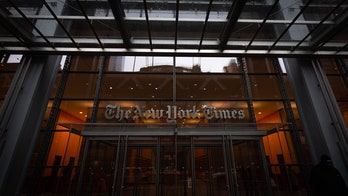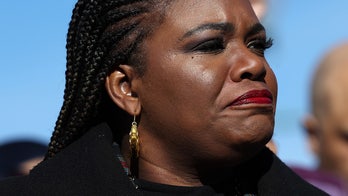Midway through one of the Vietnam War's heaviest bombing campaigns, President Richard Nixon sought reassurance from a top adviser that the U.S. military was "punishing the hell out of" the enemy, newly declassified White House tapes show. But the tapes also captured the precautions the commander-in-chief took to try to limit civilian casualties.
The revelations emerged from some 200 hours of once-secret audio tapes made public by the National Archives on Tuesday, along with the declassification of some 90,000 pages of Nixon White House documents never before accessible to researchers.
The tapes cover November 1972 to January 1973, a period that witnessed Nixon's historic landslide re-election and his prosecution of Linebacker II, the code name for the massive aerial bombardment of military and industrial targets in North Vietnam that U.S. warplanes launched from December 18-29, 1972.
For more on the declassified Nixon papers and tapes, watch Fox News coverage throughout the day on Wednesday and "Special Report with Brit Hume" at 6 p.m. EST.
Four days before the bombing campaign began, the president could be heard complaining to his national security adviser, Henry A. Kissinger, about the pressure being brought to bear on his conduct of the war by "left wing" activists and reporters.
"The North [Vietnamese] are smart enough to know that the Congress will pull the string on us," Nixon told Kissinger in an Oval Office conversation on December 14. "The left wing in this country is undoubtedly telling the North Vietnamese: 'Hang tight. The Congress is going to screw these bastards." ... You, see the left wing, our friends in the press can't bear the thought of us ending this war....They can't bear it."
As Kissinger's deputy, Alexander Haig, listened silently, Nixon also sought to buck up the morale of his NSC chief, telling Kissinger: "There's no goddamn reason for you to be discouraged...There's no reason for you to look back and say, 'Well, you know, if we'd have done something different, it might have come out different.' It might not have. Who the hell knows? We are dealing here with maniacs on both sides..."
The day after Christmas, White House special counsel Charles Colson told the president that the American people needed to hear "some explanation of why it is we're continuing to bomb [North Vietnam], and that it isn't simply an exercise in trying to decimate a country."
"It's too damn bad we aren't decimating the country," Nixon snapped.
"I wish to hell we were," Colson replied.
"We're doing one hell of a lot," the president continued, marveling at North Vietnam's "war-making capabilities." But Nixon added that the North had been "clobbered this time, because...I told [Joint Chiefs Chairman Admiral Thomas] Moorer...'Now look here. May 8th, we mined, we bombed. We did a hell of a lot. And it set 'em back a year. Now, we're going to set 'em back two years."
Nixon then told Colson: "The targets they've had have been really something. Everything, except, of course, we're avoiding civilians. I mean, even -- with all the screaming about civilians, believe me: If we were trying, the goddamn place would be leveled. Leveled!"
"God, yes," replied Colson, who after pleading guilty during the Watergate scandals became a born-again Christian and dedicated his life to his Prison Fellowship ministry.
The next day, talking by telephone with Kissinger, the commander-in-chief said of the enemy: "We gave 'em a hell of a good bang, you know. And I'm glad we only lost two B-52s. That wasn't too bad."
Kissinger pointed out that a loss rate of three percent was "about average."
"We're punishing the hell out of them, aren't we?" Nixon asked.
"Oh, there's no question about it," Kissinger replied. The NSC chief added that the French foreign minister had shared with American diplomats a report from France's consul general in Hanoi in which the Frenchman fretted: "I've just lived through the most terrifying hour of my life. An unbelievable raid has just taken place."
When Kissinger, a former Harvard professor and master courtier, sought to flatter his boss, the president cut him off. "You have shown that you are not to be trifled with," Kissinger told the president, producing a mirthless chuckle from Nixon.
"I wouldn't worry about the people here," Nixon said. "I mean, they're bitching around in the news magazines. Don't worry about it, Henry. It's not all that important. The public isn't that much concerned about all this."
"I am certain," Kissinger continued, "you will go down in history as having…"
"Forget the history," Nixon interrupted. "I mean, you haven't run into a hell of a lot of flak out there, have you? People worrying about you bombing?"
"Well, I don't see many people out there," Kissinger answered. "I'm going to stay out of the social columns."
"Well, the point is: Don't let them needle you," Nixon concluded.
Nixon had installed a secret, voice-activated recording system in the Oval Office, the presidential office in the Executive Office Building, the Cabinet Room, and other locations in February 1971, and continued using the system until July 1973, when a White House aide disclosed its existence during the Senate Watergate hearings.
A yearlong legal battle for access to selected tapes, pitting Nixon against the Watergate special prosecutors, was ultimately resolved when the U.S. Supreme Court ruled, in July 1974, that the president had to turn the recordings over to investigators. He resigned from office the following month and was pardoned in September 1974 by his successor, Gerald Ford. In all, the Nixon White House made some 3,700 hours of recordings, some of which feature very poor audio quality and the vast majority of which have never been transcribed.
The documents released by the National Archives on Tuesday included papers from the files of several aides who pleaded guilty or were convicted during the Watergate scandal, including White House Chief of Staff H.R. Haldeman, who died in 1993, and Counsel John Dean, who still writes and speaks widely on Watergate and related topics.
Also released -- for the first time -- were the papers of the late J. Fred Buzhardt, who served as one of Nixon's top lawyers during the legal battle over the tapes. Buzhardt's files contained lengthy memos dissecting and challenging the sworn testimony of Dean, who became a government witness during Watergate and served as the chief accuser of Nixon and his men in subsequent hearings and trials.
Buzhardt's files also included testimony by the president's secretary and others about the discovery of an eighteen-and-a-half-minute gap in a Watergate discussion between the president and Haldeman recorded on June 20, 1972, three days after the pre-dawn arrests that touched off the scandal.
Also among the gems uncovered by Fox News in the newly declassified files were:
* A February 1969 memo by Nixon speechwriter Pat Buchanan, now a widely known pundit, stating that somewhere around 1967, he gave Richard Nixon, then a lawyer in private practice, a personal loan of $3,000. In return, Buchanan wrote, Nixon gave him an option to buy 3,000 shares in a property off the coast of Florida (which Buchanan apparently did not exercise).
* A November 1969 memo to Haldeman from Donald Rumsfeld, then director of the Office of Economic Opportunity, advising against a recommendation from Nixon aide John Ehrlichman that the White House undertake an investigation of a "troublesome" community advocacy agency in Kentucky, on the grounds that doing so "is a giant step toward getting the White House into the investigation business. It could easily get out of hand," Rumsfeld warned, adding: "It spells trouble."
* A January 1970 memo to President Nixon from his personal aide, Alexander Butterfield (later famous as the Senate Watergate committee witness who, under televised questioning by Fred Thompson, disclosed the existence of the secret White House taping system), detailing Butterfield's efforts, undertaken at Nixon's behest, to determine how many EOB offices were displaying photographs of John F. Kennedy and other past presidents. Butterfield snuck through EOB offices on New Year's Day to obtain the desired information, and had every single photograph of a past president taken down and replaced, as necessary, with Nixon's official photograph. Butterfield told Nixon he was actively working to fulfill the president's order to "ensure across-the-board loyalty of all White House Support Staff personnel even if we find it necessary to abolish current office arrangements and start over from scratch."
* A December 1971 memo from Dean to Nixon informing the president that his commutation of the prison sentence of former Teamsters boss Jimmy Hoffa -- set to take effect seventy-two hours later, on Christmas Day -- was structured in such a way as to prevent Hoffa from reclaiming his leadership of the Teamsters. Historians have long investigated the question of who inserted this clause into Hoffa's commutation, which enraged the former union boss and set up the struggle for control of the Teamsters that ultimately climaxed in Hoffa's 1975 disappearance and presumed murder.
* A December 1971 memo from Colson to Dean, sent four days after Nixon's commutation of Hoffa's prison sentence took effect, asking: "Can't we do something somehow to keep Hoffa quiet? He is becoming a national figure overnight. No good can come of this."
* And a November 1972 memo from then-Deputy White House Counsel Fred Fielding to his boss, Dean, detailing how Charles Alan Wright -- a world-renowned constitutional law professor who two years later would argue on President Nixon's behalf before the U.S. Supreme Court in the Watergate tapes case -- had been forced off the faculty of the University of Minnesota in 1955 because he and "a married woman" had held "nude parties" at Wright's house. Wright died in 2000.
James Rosen is a Fox News Washington correspondent and author of The Strong Man: John Mitchell and the Secrets of Watergate (Doubleday).




